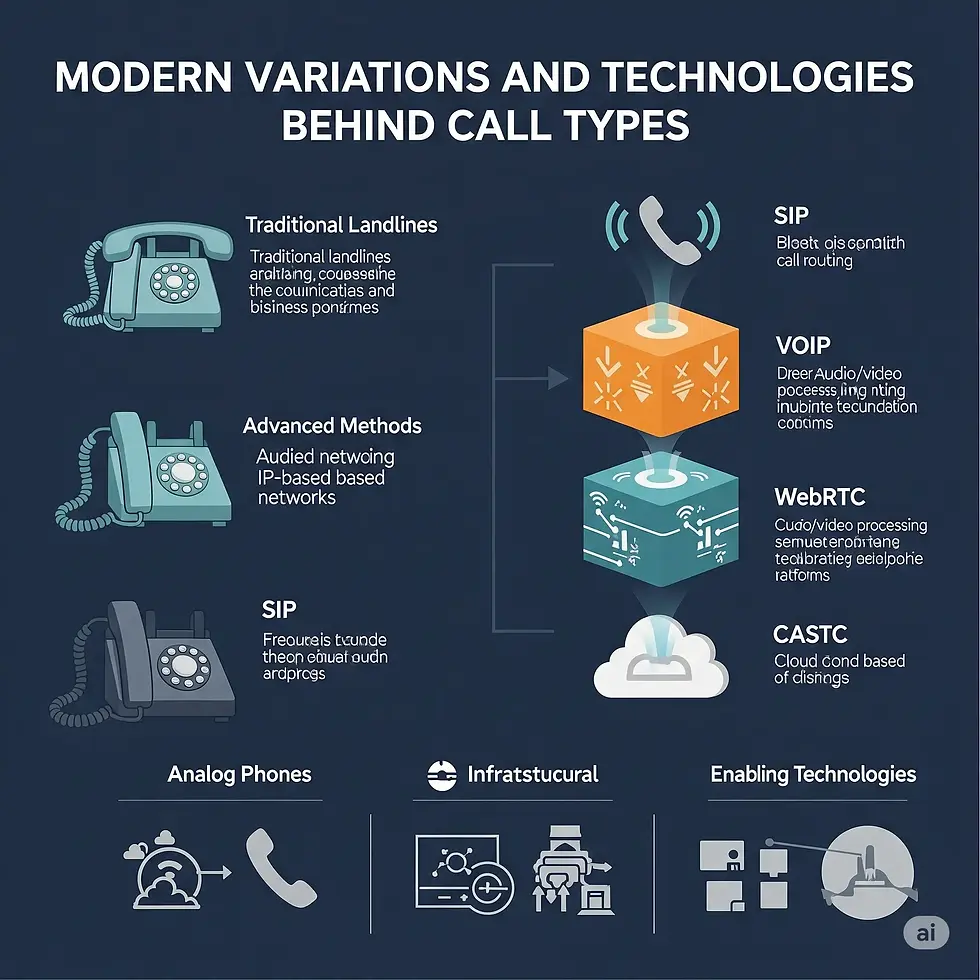What Are the Three Types of Telephone Calls?
- gsmgateway972
- Jun 30, 2025
- 3 min read

What Is a Telephone Call?
It's easy to forget the basic components of how we connect in a time where communication can be never-ending and fast. Even though the technology that powers our interactions has changed significantly, a phone call's fundamental features are remarkably constant. The basic definition of a telephone call is the use of a telecommunications system to transfer voice or other audio data between two or more participants.
Traditional vs. Modern Telephone Systems
In the past, telephone systems used complex copper wire networks to send analog speech signals. For being strong for their time, these landline or traditional systems were limited by physical hardware. A new era has been set about by the development of digital technology and the internet, and Voice over Internet Protocol (VoIP) calls have become usual. VoIP offers greater features, cost savings, and flexibility by sending voice data as digital packets over the internet.
The Three Main Types of Telephone Calls
Local Calls: They're probably most simple to understand. Two people within the same location or exchange are connected by local calls. In the past, this meant in a certain town or city. The term "local" may also refer to a large local area due to the development of telecommunications. These calls are usually very cheap and usually allowed by basic service plans.
Long-Distance Calls: Long-distance calls, as their name means, cover longer actual distances, usually between states or areas within a nation. In the past, these calls came with high costs that had been set by distance and length. Domestic long-distance calls are still unique to local calls, even if their cost has largely cut as a result of technical changes and increasing competition.
International Calls: Calls that link people in different nations are said to as international calls. This naturally calls for growing complex infrastructure and routing, mostly with multiple networks and global gateways. Because international telecommunications is so complex, international call rates have always been the highest. However, international communication is now easier than ever because to the growth of VoIP and affordable rate structures.

Modern Variations and Technologies Behind Call Types
The differences change by modern modifications, but these three groups offer a basic knowledge. For example, VoIP Technology is quite important. Whether the caller uses a regular phone or an internet-based service, a VoIP call to another country is in reality seen as an international call. These days, the difference is typically seen in network routing and related pricing structures not the actual links.
The changes have been welcomed by industries and businesses. VoIP, for instance, is widely used in call centers due to its cost-effectiveness and advanced functions such as call routing, conferencing, and connection with CRM. The ease with which calls may now be placed and received around the world has completely changed how companies run and join with their customers.
Cost, Regulation & Call Quality
There has been ongoing control and market competition surrounding the cost of phone calls, mainly those made global. While there is an ability toward reduced prices, particularly with the rise of VoIP Services and unlimited calling plans, a number of variables, such as the particular service provider, the country of destination, and rules frameworks, can affect pricing. Even while call quality is usually quite good, it can still be impacted by distance, network traffic, and the base technology.

The Future of Telephone Calls
Telephone calls are expected to become much more intelligent and seamless in the future. We should expect increasingly complex applications of AI to improve call quality, handle call routing, and offer real-time translation. A more solid and smooth communication experience may come from the continued blurring of the boundaries between traditional voice conversations, video conferences, and messaging.
Frequently Asked Questions (FAQs):
What is the difference between a long-distance and international call?
A long-distance call typically refers to a call made between different regions or states within the same country. An international call, on the other hand, is a call made between parties located in different countries.
Are VoIP calls considered international if calling another country?
Yes, a VoIP call made to a phone number in another country is considered an international call. The underlying technology (VoIP) doesn't change the geographical distinction of the destination number.




Comments